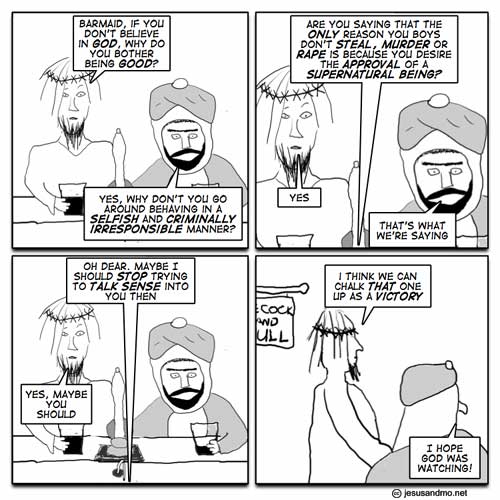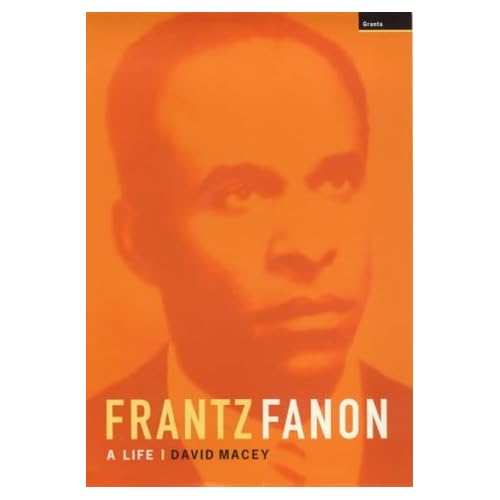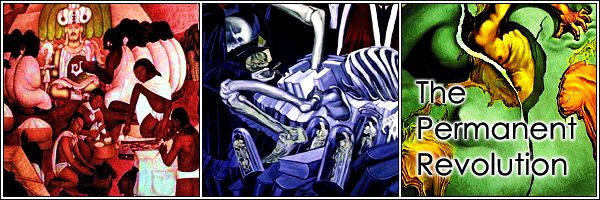Separate but Prominent
I’m discovering the Birmingham Central Library: free internet, printing facilities, books to loan, and a space to read. Nice. The building is pretty nasty looking though (good old-style socialist Brit quasi-Stalinist architecture, also known as 'brutalist', Prince Charles isn't a fan either). Well, you can’t have everything.

Now one things bothers me about the place. It is too self-consciously progressive in a rather inscrutable unhelpful way. First was a women only desk:

It’s not like to library was very busy, there was loads of other spaces, but I couldn’t really fathom the need…
Then I surfed the internet, browsing my usual sites, including the strip Jesus and Mo’. The browser then tells me that the site is not visible because of the B’ham City Council has banned it on their computers. Some people take things too far. Jesus and Mo’ is simply demystifying, harmless, thoughtful and fun irreverence. It undermines “sacred Otherhood” in the perceptions between Christians and Muslims by poking mutual fun at both. It’s not like I’d tried to visit Stormfront. Alas.

(most relevant is this one on censorship and poking fun at Mo')
But what really annoyed me was when I searched for books on the Martinican psychiatrist-cum-revolutionary-theorist Frantz Fanon. He’s been something of an idol to me in recent months and I figured if I was going to revere him I should at least know as much as I can about him. However, every time I wrote down the reference numbers of the books on him, and went to the appropriate shelf, they were missing. Curious. Is he that popular? 1, 2, then 3 books not at their respective shelves. What’s going on?
I asked one of the friendly librarians for help. Who reiterated the reference number and pointed me to a shelf. I informed her that I'd just gone through that one and she raised an eyebrow. She tapped a few more keys on the computer and informed me “Ah! It’s in the Black section…” I squinted. And sure enough, she showed me an area where all the “Black” books had been placed. There’s Frantz Fanon, snuggled among African-Americans and British Asians.
It’s not like the books have been ghettoized into some obscure part of the library. It is there, prominent, beside a nice little exhibit on slavery, racism, blackness etc. I can see the people who did this are well-meaning. In all fairness, deciding how to deal with race is always tricky (the rock and hard place of discrimination and denying difference (presumably, of experience, or worse, ‘culture’)). And, it looks like part of it may have been a temporary only setup to commemorate to the 200th anniversary of the abolition of slavery.

Nonetheless, it isn’t just this library which does this. All the Waterstones and Borders I’ve been to have their “Black and Asian” section. I must protest. I can imagine days when there weren’t any books regarding the Black experience (the library’s Africa section is a little skimpy). The correct answer is to get more books on racism, colonialism, and Blackness, not segregating them into their own section. I’d like to think Fanon would disapprove. On being systematically shoe-boxed by people in France he said “Where am I to be classified? Or, if you prefer, tucked away?” It is true that Frantz Fanon was, incidentally, Black. But he never ceased to cry out that this wasn't the sum of his being, this wasn't his determinant, that his color was not his essence. Indeed, unlike many other Black French writers at the time, Fanon denied that "Black people" were actually distinct population, except insofar as society construed them to be one.
Black Skin, White Masks, Fanon's study of Black-White relations and the pathology of racism, concluded with “At the end of this work, I would like that the reader to feel, as I do, the openness of all consciousness.” Everyone can, must, imagine what it is like to live in another person’s shoes. One of the causes of conflict is the irrational, dangerous form of selflessness whenever we talk of “Us VS Them”. They are taking our jobs, our money, our women. This stems from a fundamental lack of empathy. If I feel what others feel, if I imagine my life as another's, it is not simply that the boundary between us and them dissolves, but the very notions of “us” and “them” are shown to be bankrupt. We realize that, fundamentally, we are made of the same stuff. This is the foundation of community.
In this sense, Black-White experiences are of universal relevance. Say it again, you-nih-ver-sal. It is in a similar vein as Catholic-Protestant, Brahmin-Untouchable, gentile-Jew, Jew-Arab, Hindu-Muslim and all the other relationships in the world which our history has made painful. I looked again at the sections where Fanon and his biographies would have been had they not been put in the Black section. They would have been beside colonialism, decolonization, globalization and some political biography. He would not have been out of place.
That this literary segregation was in all likelihood done in good faith leaves a bad taste in my mouth. I’m sure some people would interpret this section as some sort of gift to minorities. “Are ‘they’ satisfied yet?”

Oh well, in the event, the biography of Fanon I picked up is very good, enormous, thoughtful, well-rounded and exhaustive. I’ve devoured the first 300 pages in the past 5 days.

Now one things bothers me about the place. It is too self-consciously progressive in a rather inscrutable unhelpful way. First was a women only desk:

It’s not like to library was very busy, there was loads of other spaces, but I couldn’t really fathom the need…
Then I surfed the internet, browsing my usual sites, including the strip Jesus and Mo’. The browser then tells me that the site is not visible because of the B’ham City Council has banned it on their computers. Some people take things too far. Jesus and Mo’ is simply demystifying, harmless, thoughtful and fun irreverence. It undermines “sacred Otherhood” in the perceptions between Christians and Muslims by poking mutual fun at both. It’s not like I’d tried to visit Stormfront. Alas.

(most relevant is this one on censorship and poking fun at Mo')
But what really annoyed me was when I searched for books on the Martinican psychiatrist-cum-revolutionary-theorist Frantz Fanon. He’s been something of an idol to me in recent months and I figured if I was going to revere him I should at least know as much as I can about him. However, every time I wrote down the reference numbers of the books on him, and went to the appropriate shelf, they were missing. Curious. Is he that popular? 1, 2, then 3 books not at their respective shelves. What’s going on?
I asked one of the friendly librarians for help. Who reiterated the reference number and pointed me to a shelf. I informed her that I'd just gone through that one and she raised an eyebrow. She tapped a few more keys on the computer and informed me “Ah! It’s in the Black section…” I squinted. And sure enough, she showed me an area where all the “Black” books had been placed. There’s Frantz Fanon, snuggled among African-Americans and British Asians.
It’s not like the books have been ghettoized into some obscure part of the library. It is there, prominent, beside a nice little exhibit on slavery, racism, blackness etc. I can see the people who did this are well-meaning. In all fairness, deciding how to deal with race is always tricky (the rock and hard place of discrimination and denying difference (presumably, of experience, or worse, ‘culture’)). And, it looks like part of it may have been a temporary only setup to commemorate to the 200th anniversary of the abolition of slavery.

Nonetheless, it isn’t just this library which does this. All the Waterstones and Borders I’ve been to have their “Black and Asian” section. I must protest. I can imagine days when there weren’t any books regarding the Black experience (the library’s Africa section is a little skimpy). The correct answer is to get more books on racism, colonialism, and Blackness, not segregating them into their own section. I’d like to think Fanon would disapprove. On being systematically shoe-boxed by people in France he said “Where am I to be classified? Or, if you prefer, tucked away?” It is true that Frantz Fanon was, incidentally, Black. But he never ceased to cry out that this wasn't the sum of his being, this wasn't his determinant, that his color was not his essence. Indeed, unlike many other Black French writers at the time, Fanon denied that "Black people" were actually distinct population, except insofar as society construed them to be one.
Black Skin, White Masks, Fanon's study of Black-White relations and the pathology of racism, concluded with “At the end of this work, I would like that the reader to feel, as I do, the openness of all consciousness.” Everyone can, must, imagine what it is like to live in another person’s shoes. One of the causes of conflict is the irrational, dangerous form of selflessness whenever we talk of “Us VS Them”. They are taking our jobs, our money, our women. This stems from a fundamental lack of empathy. If I feel what others feel, if I imagine my life as another's, it is not simply that the boundary between us and them dissolves, but the very notions of “us” and “them” are shown to be bankrupt. We realize that, fundamentally, we are made of the same stuff. This is the foundation of community.
In this sense, Black-White experiences are of universal relevance. Say it again, you-nih-ver-sal. It is in a similar vein as Catholic-Protestant, Brahmin-Untouchable, gentile-Jew, Jew-Arab, Hindu-Muslim and all the other relationships in the world which our history has made painful. I looked again at the sections where Fanon and his biographies would have been had they not been put in the Black section. They would have been beside colonialism, decolonization, globalization and some political biography. He would not have been out of place.
That this literary segregation was in all likelihood done in good faith leaves a bad taste in my mouth. I’m sure some people would interpret this section as some sort of gift to minorities. “Are ‘they’ satisfied yet?”

Oh well, in the event, the biography of Fanon I picked up is very good, enormous, thoughtful, well-rounded and exhaustive. I’ve devoured the first 300 pages in the past 5 days.



0 Comments:
Post a Comment
<< Home